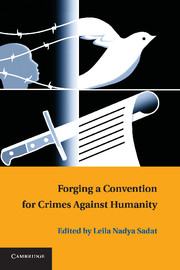Book contents
- Frontmatter
- Contents
- Figures and Maps
- Crimes Against Humanity Initiative: Steering Committee
- Biographies of Contributors
- Foreword
- Preface and Acknowledgments
- Crimes Against Humanity and the Responsibility to Protect
- 1 History of Efforts to Codify Crimes Against Humanity
- 2 The Universal Repression of Crimes Against Humanity before National Jurisdictions
- 3 Revisiting the Architecture of Crimes Against Humanity
- 4 The Bright Red Thread
- 5 Gender-Based Crimes Against Humanity
- 6 “Chapeau Elements” of Crimes Against Humanity in the Jurisprudence of the UN Ad Hoc Tribunals
- 7 The Definition of Crimes Against Humanity and the Question of a “Policy” Element
- 8 Ethnic Cleansing as Euphemism, Metaphor, Criminology, and Law
- 9 Immunities and Amnesties
- 10 Modes of Participation
- 11 Terrorism and Crimes Against Humanity
- 12 Crimes Against Humanity and the International Criminal Court
- 13 Crimes Against Humanity and the Responsibility to Protect
- 14 Re-enforcing Enforcement in a Specialized Convention on Crimes Against Humanity
- 15 Why the World Needs an International Convention on Crimes Against Humanity
- Appendices
- Testimonials and Endorsements
- Index
- References
14 - Re-enforcing Enforcement in a Specialized Convention on Crimes Against Humanity
Inter-State Cooperation, Mutual Legal Assistance, and the Aut Dedere Aut Judicare Obligation
Published online by Cambridge University Press: 01 June 2011
- Frontmatter
- Contents
- Figures and Maps
- Crimes Against Humanity Initiative: Steering Committee
- Biographies of Contributors
- Foreword
- Preface and Acknowledgments
- Crimes Against Humanity and the Responsibility to Protect
- 1 History of Efforts to Codify Crimes Against Humanity
- 2 The Universal Repression of Crimes Against Humanity before National Jurisdictions
- 3 Revisiting the Architecture of Crimes Against Humanity
- 4 The Bright Red Thread
- 5 Gender-Based Crimes Against Humanity
- 6 “Chapeau Elements” of Crimes Against Humanity in the Jurisprudence of the UN Ad Hoc Tribunals
- 7 The Definition of Crimes Against Humanity and the Question of a “Policy” Element
- 8 Ethnic Cleansing as Euphemism, Metaphor, Criminology, and Law
- 9 Immunities and Amnesties
- 10 Modes of Participation
- 11 Terrorism and Crimes Against Humanity
- 12 Crimes Against Humanity and the International Criminal Court
- 13 Crimes Against Humanity and the Responsibility to Protect
- 14 Re-enforcing Enforcement in a Specialized Convention on Crimes Against Humanity
- 15 Why the World Needs an International Convention on Crimes Against Humanity
- Appendices
- Testimonials and Endorsements
- Index
- References
Summary
The fight against impunity for serious crimes under international law, such as genocide, war crimes, and crimes against humanity, continues. A new effort in this fight focusing on crimes against humanity is the Crimes Against Humanity Initiative launched by Washington University Law's Whitney R. Harris World Law Institute to study the international law regarding crimes against humanity and to draft a multilateral treaty condemning and prohibiting such crimes. The Crimes Against Humanity Initiative identified a need for a specialized convention on crimes against humanity, because “most crimes against humanity remain outside the ambit of a universal treaty, unless they involve a situation within the jurisdiction of the International Criminal Court. Even in that case, no provision for State Responsibility exists, and no mechanisms for interstate enforcement are provided for.”
The key to effectively fighting impunity is robust enforcement mechanisms. Thus, a new specialized convention on crimes against humanity should aim to bridge gaps in enforcement by providing “much-needed provisions on interstate cooperation in investigation and punishment of perpetrators of crimes against humanity, filling both a normative gap, and providing critically important enforcement mechanisms.” This should include “fostering the notion that states have an obligation to prosecute. Such an obligation, however, must be coupled with providing the realistic capacity to prosecute which, for many states, will necessarily involve prosecutions requiring interstate cooperation in the form of mutual legal assistance.”
This chapter addresses enforcement measures with regard to crimes against humanity, focusing on forms of inter-State cooperation.
- Type
- Chapter
- Information
- Forging a Convention for Crimes against Humanity , pp. 323 - 344Publisher: Cambridge University PressPrint publication year: 2011
References
- 1
- Cited by



